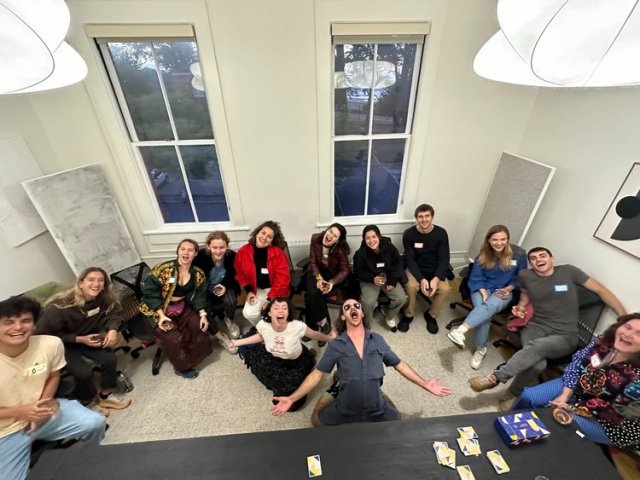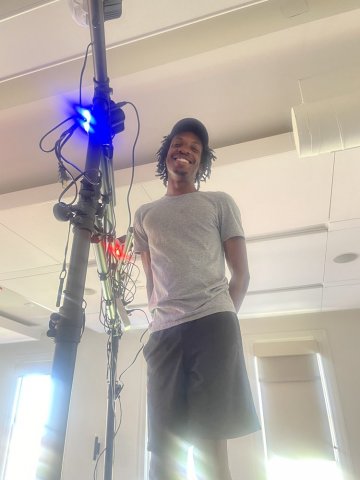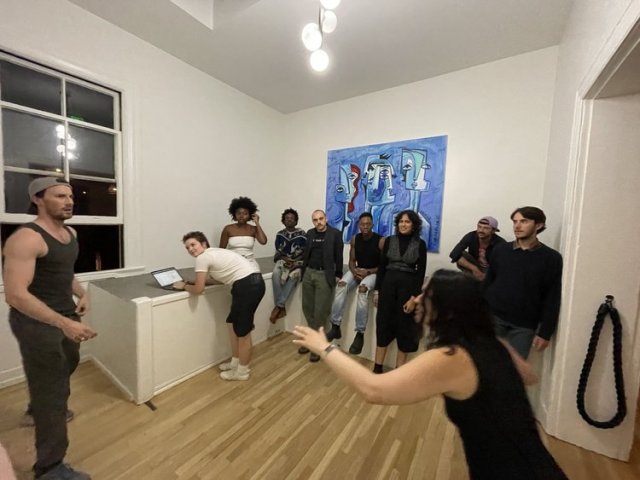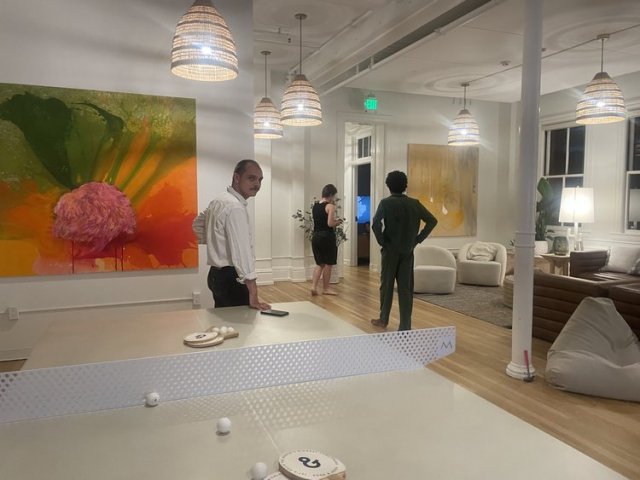Ivanov - An Immersive Adaptation
Classic Chekhov as Basis for Stylized, Interactive Performance
By: Victor Cordell - Oct 09, 2023
As immersive entertainment becomes more prevalent, new variants sprout up. When Meow Wolf initiated its first installation in Santa Fe, NM, it claimed to be the first immersive art installation, allowing visitors to enjoy any variety of visual experiences by taking their own paths through dozens of dizzying dioramas. San Franciscans may know “The Speakeasy,” an immersive theatrical experience with a number of different performances that the patron can visit in whatever order, which evokes the city’s Barbary Coast reputation. In other performance works, audiences have selected which actors to play which roles or voted on who should be the perpetrator in who-dunnits.
The Santa Fe based Exodus Ensemble has introduced theater that has become about as immersive as possible, short of the patrons spontaneously driving the narrative. Performed by a troupe of talented and committed actors, this stimulating and exciting new form of entertainment already has a track record of delighting those who value youth, spontaneity, innovation, audience participation, and rule breaking. Those preferring more established modes may be split on whether this kind of entertainment works for them.
The company’s “Ivanov” defies traditional theater in many ways. Designed for an audience of around a dozen, the play is not presented on a stage, but moves scene-by-scene from one room to another in a house or other facility, depending on where it is presented. There is no fourth wall, as the performers act in close quarters and are sometimes interspersed with the audience. And although the performers stay in character, they often interact with audience members who sometimes make contributions to the performance. An often discomforting, yet interesting and involving effect is that the observer can feel that acquaintances rather than actors or fictional characters are going through these trials.
The company focuses on redesigning classics, and this was the company’s very first mounting, which it has now performed over 80 times. One might ask, why “Ivanov”? Although it is not recognized as one of Chekhov’s four most famous and esteemed plays, one may ask why to that as well. It does include the requisite dollop of Russian character and society, but it also contains the additional dimensions of prejudice, as Ivanov’s wife is Jewish, as well as a tragic and violent ending. Briefly, Ivanov is in debt; his wife Anna is chronically ill; and they have come to live with their friends, the Lebedev family, but the closeness exacerbates temptation and conflict.
The proceedings begin before the formal plot development with actors already in character, but if you’re not aware of the device, you could easily be fooled. Outdoors, the effusive greeter introduces himself as Borkin, and unless you know the minor character from the play, you might think he’s a member of the acting company who happens to be from Eastern Europe. It is actually versatile actor Mikie Beatty, originally from Placerville, who also provides tuneful musical accompaniment throughout the play.
Patrons then enter the first of many performance rooms and are regaled with drinks and badinage by Sasha. She keeps saying that she is 16 years old, which is convincing, but as it turns out, very untrue. She is actually the hyperactive, screeching, and always engaging Emily Neifert who plays Sasha, a young woman in the Lebedev family who falls in love with the married Ivanov.
This realization of the play offers a broad-brushstrokes look at the original, but with situations and commentary that are American (only Borkin has an accent), contemporary, and localized to the community of the performance. A married couple becomes a gay couple in a relationship, Sasha is 16 instead of 20, and so forth. Blustery behaviors and speaking styles owe more to the likes of David Mamet than Anton Chekhov. Characters have volatile reactions, especially the supposedly melancholy Ivanov, who is played with great passion and authority by Garrett Young.
Despite a severely abbreviated Cliff Notes version of the source material, with wholesale elimination of secondary characters and scenes, this adaptation runs a good 3 ½ hours. Some measure of the length is attributed to moving the action to a new room every several minutes and breaks for bathroom, libations, and very good charcuterie (how bad is that!).
The main reason for the length is the embellishments. Everything about Exodus Ensemble appears to be a labor of love, but love wants love in return. The script is written by company members, and there does seem to be an element of each actor wanting their “close up,” so it’s easy to suspect a writing process in which each actor is writing material to be able to display their talents. Again, this is an outcome that will please some attendees and not others. The complex logistics of the piece are effectively orchestrated by Artistic Director April Cleveland.
The backstory to The Exodus Ensemble is worth revealing. After the onset of the pandemic in 2020, 13 former participants in DePaul University drama programs magically converged from across the country to settle into a community house in Santa Fe, NM. This was a great choice because it is a fantastic city and home to Meow Wolf, which would inspire and support the company’s mission. The group’s intent was to develop avant-garde theatrical works and performances that break with the past. To that end, they have created several productions for their home market that they are now taking on the road. A few months after their stint in San Francisco, they travel to New York City.
For their visit to San Francisco, Exodus has offered a fully guided, linear “Ivanov” as well as “Zero,” a blend of sci-fi and artificial intelligence that allows patrons to take different paths through the adventure. While the performances live up to their billings, the question is their sustainability. The company does not charge for tickets but welcomes donations while socializing after the performance or any other time. For the more intimate “Ivanov” they welcome any contribution, but suggest that donations of $500 would especially help them survive. “Zero” allows 28 guests with a suggested donation of $200.
Needless to say, for a group formed communally in a small market (though individually they do take on other professional gigs elsewhere), to offer such elitist entertainment, is anomalous. Although they have successfully raised donations to launch their program and reach this juncture, the question is if this model needs to be modified to last.
Kudos and thanks to Edge & Node House of Web3 for their generosity in making their wonderful Presidio co-creation space for Web3 innovation available for these stimulating productions. A small sample of their space can be seen in the photos.
“Ivanov” (the San Francisco tour) based on the play by Anton Chekhov and adapted by Exodus Ensemble is produced by The Exodus Ensemble of Santa Fe, NM and plays at Edge & Node House of Web3, Building 103 Montgomery St., San Francisco Presidio, CA. The company’s residency runs through October 10, 2023.






